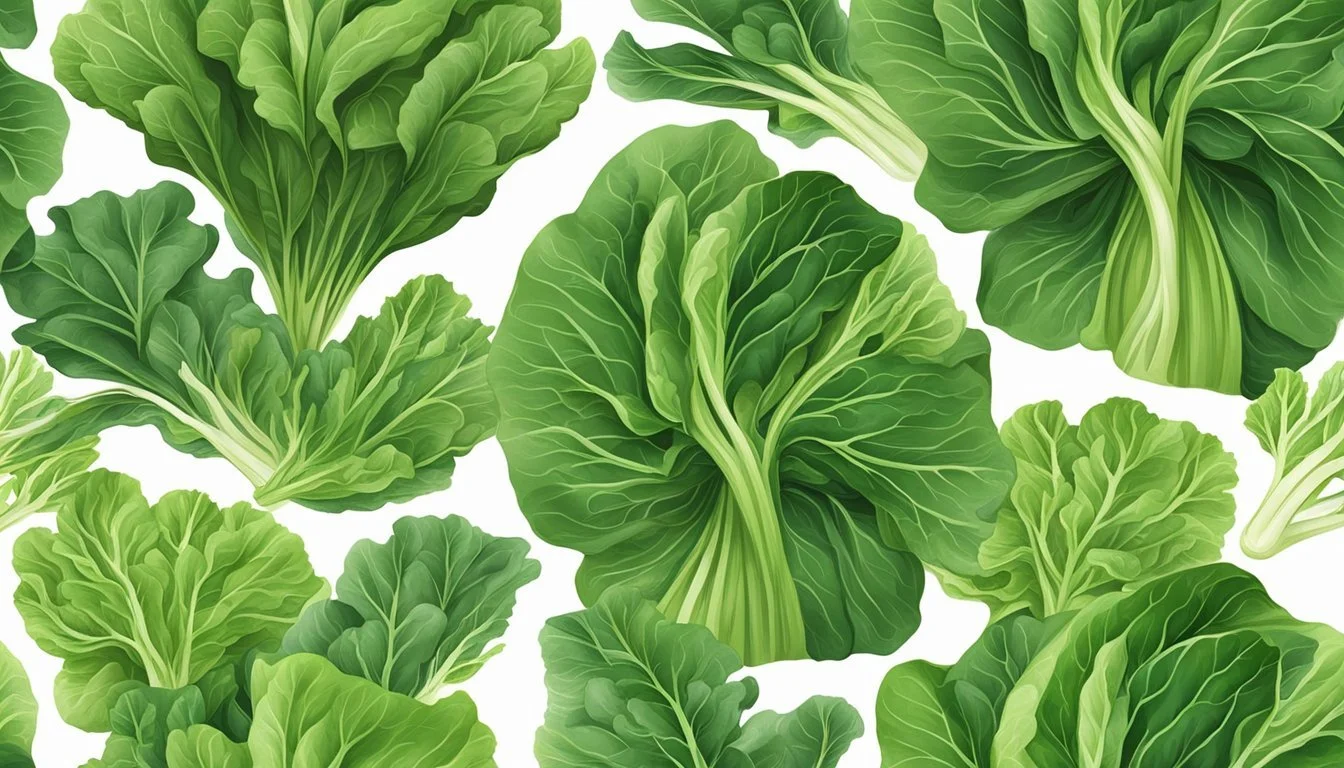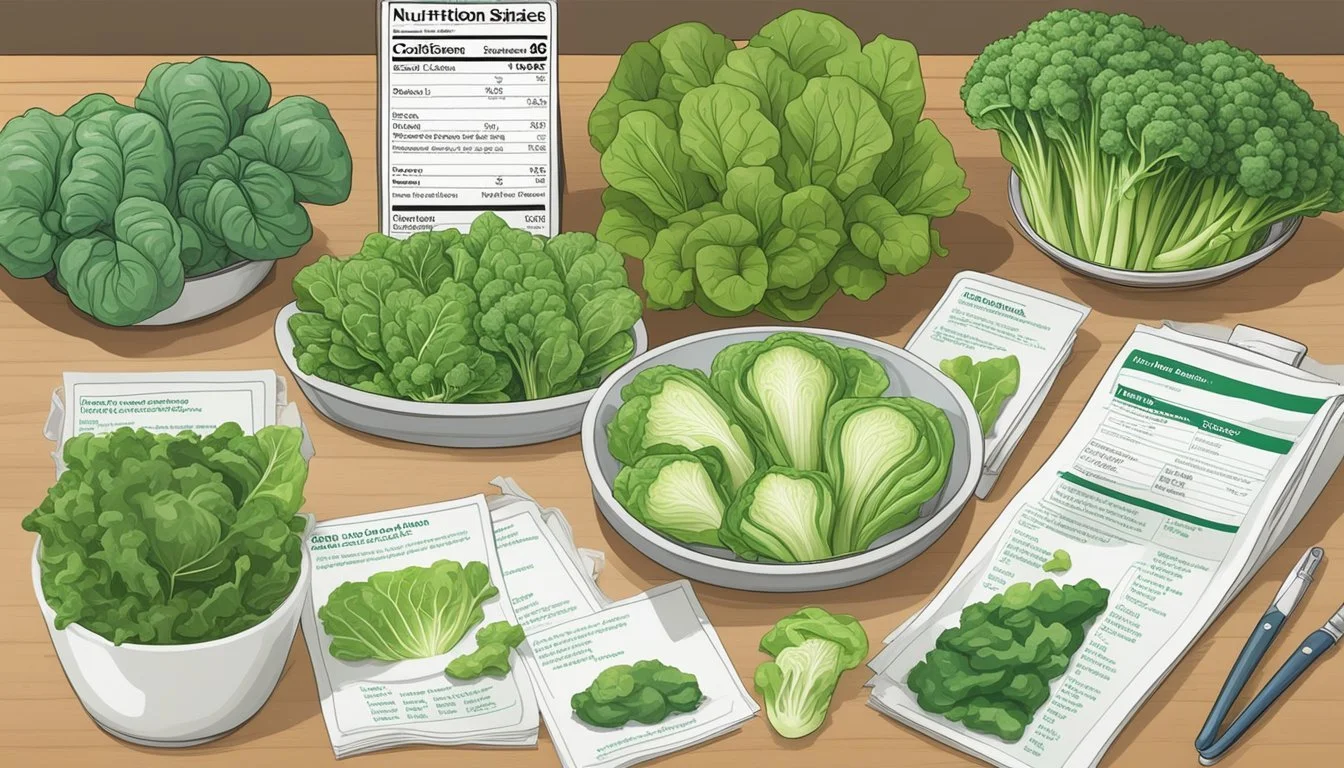Yu Choy Substitutes
Best Alternatives for Your Recipes
When it comes to incorporating leafy greens into a diet, Yu Choy stands out with its mild, sweet flavor and crunchy texture. Yet, when Yu Choy isn't available, opting for suitable substitutes like Chinese broccoli or bok choy can ensure your dishes maintain the nutritional benefits and delicious taste that leafy greens offer. These alternatives provide similar textures and flavors, making them excellent choices for various recipes.
Yu Choy is renowned for its versatility in Asian cuisine, particularly in stir-fries and soups. If you're looking to replicate Yu Choy's tender and crunchy qualities, other substitutes such as napa cabbage, spinach, or choy sum can serve as excellent replacements. Each of these vegetables not only shares a close taste profile with Yu Choy but also contributes richly to a balanced diet with their nutritious content.
Ensuring that your dishes remain balanced in terms of flavor and nutrition, these substitutes can seamlessly fit into your recipes. Whether you are looking to diversify your meals or simply need an alternative to Yu Choy, these vegetables offer both taste and health benefits, making them worthy additions to your culinary repertoire.
Understanding Yu Choy
Yu Choy, also known as choy sum, is a versatile vegetable commonly used in various Asian dishes. It provides numerous health benefits due to its rich nutritional profile and is easy to incorporate into different culinary applications.
Cultivation and Characteristics
Yu Choy is a member of the brassica family and is closely related to Chinese broccoli. It features dark green leaves and slender stalks that give it a tender and crunchy texture. The stalks are light green and often enjoyed for their mild, slightly bitter taste. Ideal growing conditions for Yu Choy include cool temperatures and moderate sunlight, which help maintain its nutrient density and flavor. This vegetable is often harvested before it flowers, although the young blossoms are also edible and add an extra layer of taste.
Nutritional Profile
Yu Choy is a nutritional powerhouse. It's rich in vitamins A, C, and K, as well as essential minerals like calcium and iron. One of its standout features is its high fiber content, which promotes digestive health. The presence of antioxidants in Yu Choy also aids in reducing inflammation and improving overall health. These nutrients can help maintain strong bones, support immune function, and improve skin health. Yu Choy is low in calories, making it an excellent choice for those on a calorie-controlled diet while still meeting nutritional needs.
Culinary Uses
Yu Choy is incredibly versatile in the kitchen. It's often used in stir-fries and soups but can also be enjoyed raw in salads. Its tender leaves and crunchy stalks add texture and a slightly bitter taste to dishes. When cooking, it's best to briefly blanch or stir-fry Yu Choy to preserve its nutrients and vibrant color. This vegetable pairs well with flavors like garlic, soy sauce, and sesame oil. Additionally, it can serve as a substitute for other greens such as bok choy, offering similar textures and flavors. Whether cooked or raw, Yu Choy is a key ingredient in many traditional and modern Asian cuisines.
Popular Yu Choy Substitutes
When yu choy isn't available, there are several vegetables that can substitute well, each bringing its own unique texture and flavor while maintaining a similar nutritional profile. These substitutes can be grouped among Asian greens and other leafy vegetables.
Bok Choy and Its Varieties
Bok choy is an excellent substitute for yu choy, sharing a comparable mild, sweet flavor and a pleasant crunch. Bok choy comes in different varieties, including baby bok choy and pak choi. Baby bok choy is particularly notable for its tender leaves and slightly sweet taste.
Pak choi offers a similar crisp texture with its green leaves and pale stems. Its subtle flavor profile makes it versatile in many dishes. These attributes make bok choy a practical substitute in stir-fries, soups, and salads.
Other Asian Greens
Napa cabbage and Chinese cabbage are also viable substitutes. Napa cabbage has a mild and slightly sweet taste, similar to yu choy, and is widely used in Asian cooking. It has a leafy structure with a crunchy texture, perfect for cooking or raw dishes.
Gai lan (Chinese broccoli) and choy sum offer distinct yet compatible flavors. Gai lan has a slightly bitter taste and crisp stems, while choy sum's mild flavor and tender texture work well in a variety of recipes. Tatsoi, another option, has a mustardy yet mild taste and tender leaves, making it a great inclusion in salads or soups.
Leafy Greens Beyond Asia
If Asian greens are unavailable, consider spinach, kale, or mustard greens. Spinach offers a delicate texture and mild flavor, although it lacks the crunch of yu choy. Kale, especially baby kale, provides a robust texture and a slightly bitter taste but can soften when cooked.
Mustard greens contribute a peppery kick, which can invigorate dishes needing an extra bite. Lastly, Swiss chard combines a slightly bitter flavor with a firm texture, serving as an effective substitution in many culinary applications requiring yu choy.
By understanding these options, you can confidently substitute yu choy in various recipes without missing out on its nutritional and culinary benefits.
Selecting and Storing Substitutes
When picking and keeping substitutes for Yu Choy, attention to freshness and proper storage techniques is key. Start by assessing the appearance and texture of the vegetable and then follow best practices for refrigeration to extend its shelf life.
Assessing Freshness and Quality
Choose substitutes with vibrant, dark green leaves and firm, crunchy stems. Vegetables like Swiss chard and gai lan should have no wilting or yellowing. Avoid those with a bitter taste by smelling the produce—fresh substitutes should have a neutral or slightly earthy scent.
Look for any signs of deterioration, like slimy patches or bruises, which indicate poor quality. Freshness impacts the meal's taste and nutritional value, making it crucial for a healthy diet.
Storage Tips for Longevity
Proper storage significantly extends the shelf life of Yu Choy substitutes. To keep them fresh, wrap them in damp paper towels and place them in plastic bags. Store these bags in the refrigerator's crisper drawer.
Alternatively, submerge the stems in water and loosely cover the leaves with a plastic bag before refrigerating. This method helps retain their crunch and flavor. Regularly check and remove any deteriorating parts to prevent spoilage of the entire batch.
Incorporating Substitutes in Recipes
When substituting ingredients, it's essential to make the necessary adjustments to maintain the desired taste and texture in your dishes. Different cooking methods may also need to be adapted to ensure that the substitutes are integrated seamlessly.
Adjustments for Taste and Texture
Using substitutes for Yu Choy requires careful consideration of flavors and textures. Bok choy, with its crunchy stems and tender leaves, is a suitable alternative and can be used in soups, stir-fries, and salads. For a slightly bitter flavor, Swiss chard is also an excellent substitute.
Spinach can replace Yu Choy in many recipes. Its tender leaves have a mild taste, and it works well in soups and smoothies. Chinese broccoli offers a sweet and earthy flavor with a crunch similar to Yu Choy. Leeks, while more subtle in flavor, can provide a unique twist to your recipes.
Variations in Cooking Methods
Adapt your cooking methods when using different substitutes for Yu Choy. Spinach can cook faster than Yu Choy, so it should be added later in the cooking process. For stir-fries, Swiss chard stems can be sautéed first before adding the leaves to ensure they remain tender-crisp.
Chinese broccoli can handle high-heat cooking methods well, making it a great substitute in stir-fries and soups. When using leeks, consider slicing them thin to integrate better with other ingredients. Each substitute may alter the cooking time and method slightly, but with careful adjustments, the final dish will still be delicious and satisfying.
Health Considerations of Substitutes
Substitutes for Yu choy offer various nutritional benefits, including essential vitamins and minerals. These alternatives also provide dietary fiber that is crucial for effective digestion.
Dietary Fiber and Digestion
Many substitutes for Yu choy are high in dietary fiber, which plays a significant role in promoting healthy digestion. Vegetables such as spinach, Swiss chard, and Chinese broccoli are excellent sources of fiber.
Fiber helps regulate the digestive system by preventing constipation and promoting regular bowel movements. Spinach, for instance, is well-known for its high fiber content, making it a beneficial substitute.
Another good option is Swiss chard, which also contributes a substantial amount of fiber to the diet. Including these fiber-rich vegetables can improve overall gut health and aid in maintaining a balanced diet.
Vitamins and Minerals Content
Substitutes for Yu choy are also rich in various vitamins and minerals. Swiss chard and spinach are particularly noted for their high levels of vitamins A and C. Vitamin A supports vision and immune function, while vitamin C is essential for skin health and collagen production.
Chinese broccoli (gai lan) includes significant amounts of vitamin K, which is vital for blood clotting and bone health. Additionally, these vegetables are good sources of calcium and iron, essential minerals for bone strength and oxygen transportation in the blood, respectively.
Incorporating these substitutes into meals can ensure a diverse intake of necessary nutrients, supporting overall health and well-being.
Comparing Flavors and Textures
Yu choy substitutes bring unique flavors and textures to dishes. Understanding these substitutions can enhance your recipes, offering either similar or distinct characteristics based on what you choose.
Substitute Flavor Profiles
Yu choy has a mild, sweet flavor with a slight peppery note. When seeking substitutes, one can consider bok choy, which shares a similar sweet and mild flavor. On the other hand, rapini provides a slightly bitter taste, making it suitable for those who prefer a more pronounced flavor. Napa cabbage, another close relative, offers a pleasantly mild flavor that complements many recipes. Swiss chard and kale can also be useful substitutes. Swiss chard has a subtle earthiness, while kale offers a more robust and slightly bitter profile.
Texture Differences
Yu choy features crunchy stems and tender leaves. Bok choy has a comparable crisp texture, especially in its stalks, making it an excellent substitute for maintaining crunch. Rapini, meanwhile, has a more fibrous texture with slight bitterness, adding a different dimension to dishes. Napa cabbage provides a soft yet crunchy texture when cooked, closely mimicking yu choy’s bite. Swiss chard has slightly firmer stems but still offers a tender leaf structure, while kale tends to be more fibrous and chewy than yu choy. Each substitute enhances dishes with unique textures, providing culinary variety.
Conclusion
When looking for substitutes for Yu Choy, several options can offer similar nutritional and taste benefits.
Bok choy is a top substitute, favored for its mild flavor and versatility. Both vegetables can be used interchangeably in many recipes.
Other substitutes include napa cabbage and choy sum. These vegetables share Yu Choy's slightly bitter taste and crunchy texture.
Spinach can be another option. Though milder in flavor, it's widely available and easy to cook.
For those seeking a spicier alternative, mustard greens provide a robust flavor that can enhance various dishes.
Celery and Swiss chard are additional substitutes. Both offer unique textures and can diversify the cooking experience.
In terms of nutrition, all these substitutes provide essential vitamins and minerals, making them valuable additions to any meal or diet plan.
Here's a quick reference table:
Substitute Similarity to Yu Choy Key Characteristics Bok Choy High Mild flavor, crunchy texture Napa Cabbage Moderate Slightly bitter, versatile Choy Sum High Slightly bitter with a crisp texture Spinach Moderate Mild flavor, readily available Mustard Greens High Spicy flavor, nutrient-rich Celery Moderate Unique texture, adds crunch Swiss Chard Moderate Mildly bitter, colorful stems
By considering these vegetable options, anyone can continue to enjoy diverse and nutritious meals even when Yu Choy is unavailable.







